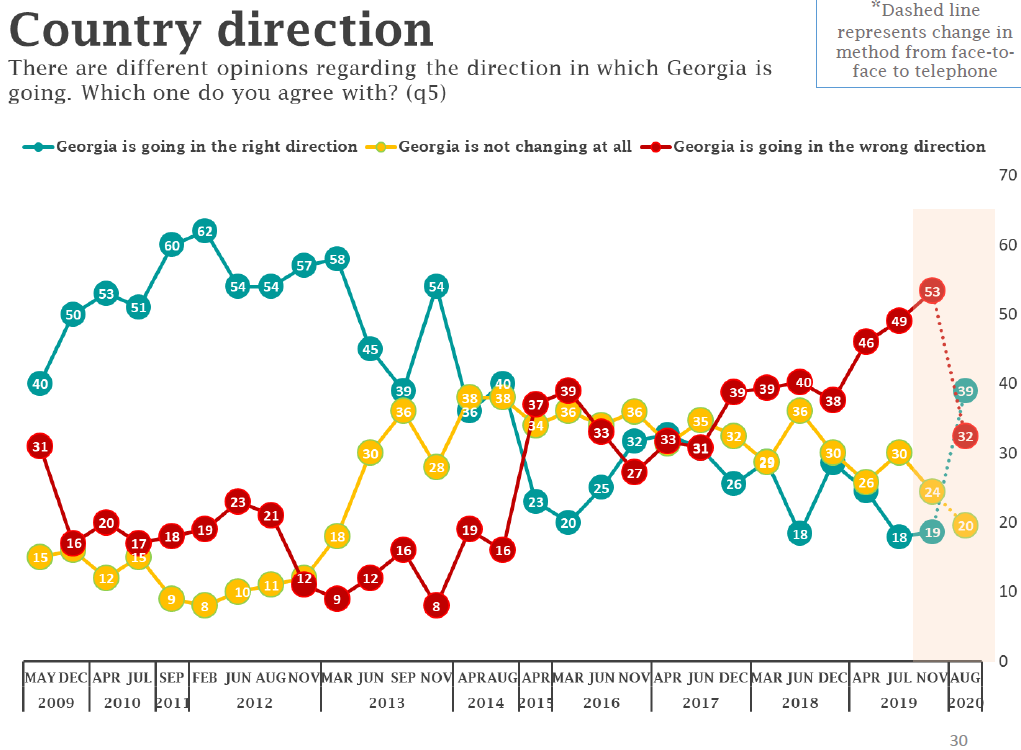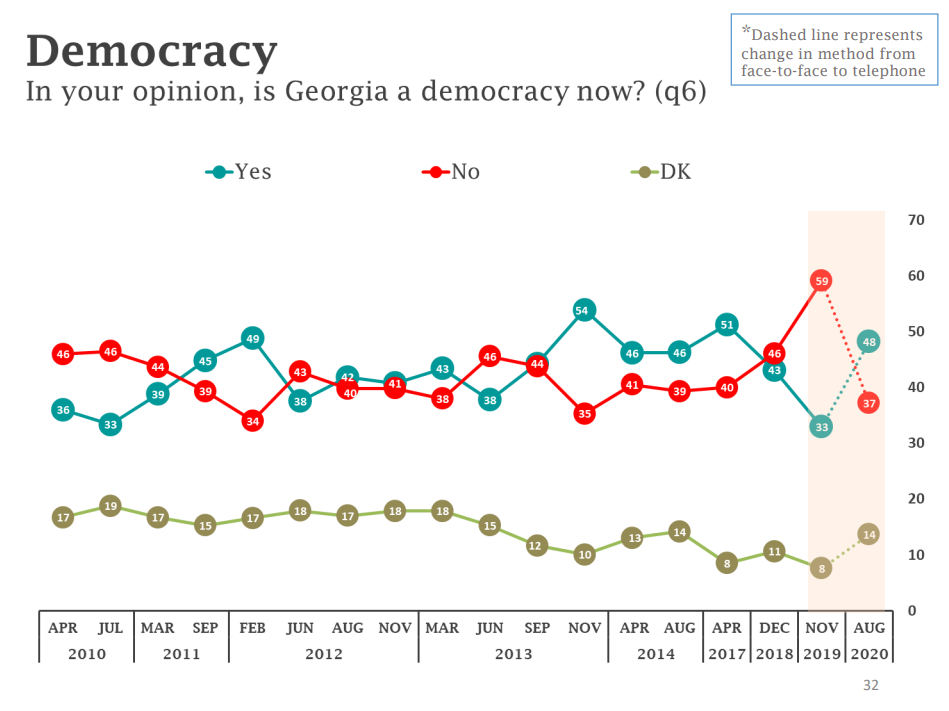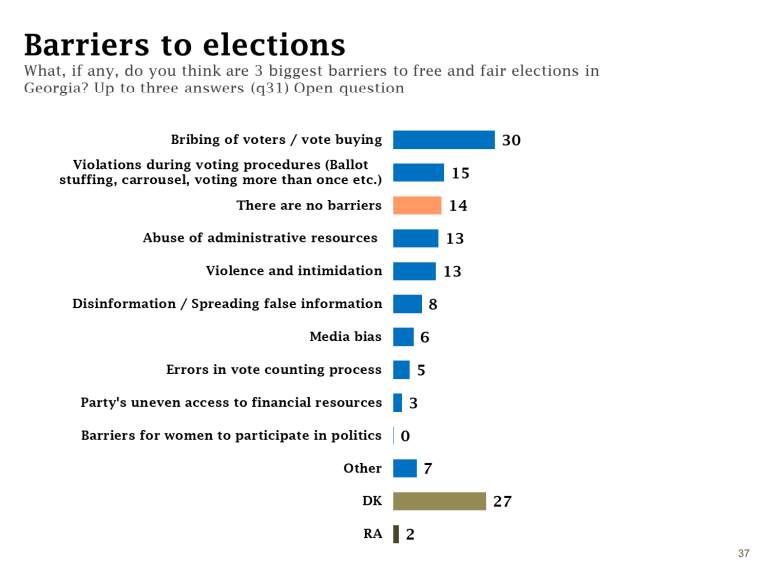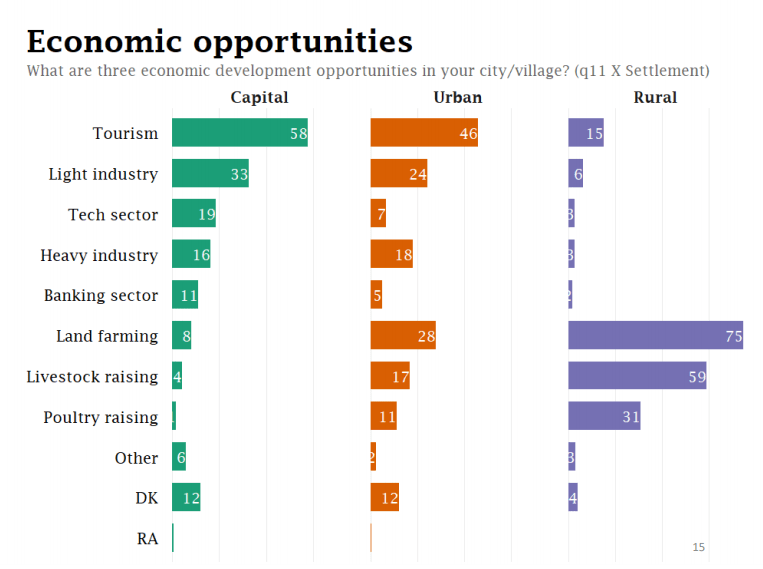
Public Attitudes in NDI Poll
According to the public opinion survey released by the National Democratic Institute (NDI) released on September 14, some six weeks ahead of October 31 parliamentary polls, although economic issues remain the major concern for Georgians, the number of citizens thinking that the country is going in the right direction had doubled since November.
Asked about in which direction Georgia is going, 39% said in a right direction (up from 19% in November 2019), the wrong direction – 32% (down from 53% in November), while 20% say Georgia is not changing at all (down from 24% in November).

Assessing the state of democracy in the country, 48% of the respondents think Georgia is a democracy now, a significant increase from 33% in November 2019. 37% reckon that Georgia is not a democracy now, a significant drop from 59% in November.

October Parliamentary Elections
The poll shows that Georgians remain committed to voting on election day – 88%, but a large number of voters – 59%, remain undecided just a few weeks before the crucial elections.
Asked which party they would vote for if the parliamentary elections were held tomorrow, 40% of respondents said they do not know, 24% refused to answer, 17% named the ruling Georgian Dream party, 9% said no party, 5% said the UNM, 5% named other parties. “The declared support for individual parties are so low that they cannot be taken as a guide to the outcome of future elections,” NDI said.
“Such a high number of undecided voters presents both a challenge and opportunity for parties. With weeks until the elections, they have plenty of work to do to inspire and motivate citizens by offering relevant policies on the issues citizens have consistently prioritized,” said Alan Gillam, new NDI Georgia Country Director.

The Poll finds that the majority of Georgians – 56 % – are confident that the parliamentary elections will be conducted in a free and fair environment, however, concerns remain, as approximately a third of Georgians (30 percent) report that bribing of voters presents the biggest challenge to the integrity of elections.
36% of Georgians said the party’s economic policy is the most important when deciding which political force to vote for, followed by the party stance on healthcare issues – 12%, party stance on rule of law – 12%, party’s policy on national security issues – 10%, education policy – 7%, party’s position on foreign policy – 5%.
National and local Issues
Jobs, poverty and territorial integrity were named as the most important national issues by 49%, 39% and 28%, respectively, followed by rising prices/inflation – 20%, education – 13% and pensions – 13%.
Identifying the biggest issues facing the Georgian economy today, 67% of respondents named unemployment, rising prices/inflation was named by 33%, poverty – 22%, low wages – 20%, national currency devaluation – 18%, high taxes – 11 %, COVID-19 – 10%, closing the borders – 6%.

At the local level, Georgians are most concerned with the following infrastructure issues: – roads – 31%, water- supply – 22%, pollution of environment and traffic – 13% each, parks and green spaces – 12%, public transport – 10%.
In the Georgian capital, traffic was named as the most important issue by 31%, followed by roads – 23%, pollution of the environment – 22%, parks and green spaces – 20% and public transport – 17%. Respondents from rural communities named water supply – 41% and roads – 40% as the most pressing issues, however.
In this context, an overwhelming majority of the respondents – 88% – agreed with the statement that “protecting environment and reducing air pollution is important, even if it requires stricter regulations and rules for businesses as well as individuals.” Speaking of the most pressing environmental issues, Tbilisites responded air pollution – 75% and food safety – 18%.
This post is also available in: ქართული Русский